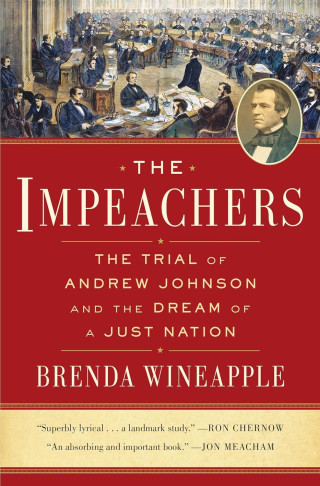Before we get to Edmund Ross, let’s talk about Pence’s framing of the Johnson impeachment. He writes that Republicans “hatched a plot” to impeach him and “found their grounds in a rather pedestrian law, the Tenure of Office Act.” Pence cites John F. Kennedy’s Profiles in Courage for authority. Are Pence and Kennedy right?
What Kennedy said in that book is absolutely egregious. Kennedy wrote that “the actual cause for which the President was being tried was not fundamental to the welfare of the nation.” Johnson was being tried for abuse of power and obstruction of justice—in particular, squandering the Union victory, turning back the clock, reinstating white supremacy, and keeping black people as third-class citizens. How could that not be central to the “welfare of the nation”? It’s absolutely outrageous.
But Republicans did cite the Tenure of Office Act, which barred Johnson from removing Cabinet secretaries without congressional approval, in their articles of impeachment.
Johnson violating the Tenure of Office Act was the straw that broke the camel’s back. Republicans had been very reluctant to impeach Johnson. The Republicans were trying to find ways to curb him, to pass legislation and an amendment that would consolidate the Union victory and make sure that the effects of slavery were abolished. They didn’t vote to impeach until Johnson just went too far and broke a law. That law was the Tenure of Office Act. Eight of the impeachment articles dealt with that. But the real reason underneath it all was Johnson’s abuse of power, his rejection of the legitimacy of Congress. Johnson was eroding the tripartite government and arrogating all power to himself. Two articles of impeachment dealt with that—his abuse of power and the denigrations of democracy.
Pence writes that Republicans led a “stampede” to impeach Johnson—
There was no stampede! There were seven Republicans who voted against impeachment. Impeachment had not come quickly or easily. It only came when Johnson actually broke the law. Remember, it was 1868, and Republicans thought they would be rid of Johnson after the upcoming election. There was no stampede. That’s just historical bullshit.
Let’s talk about Ross. Kennedy viewed him as a profile on courage, and Pence concurs. He writes that “Ross was determined to render a fair judgment” and “stayed true to his convictions.” Accurate?
No. Ross was a junior senator from Kansas and he needed money and favors. His constituents wanted him to vote to remove Johnson from office. There was no reason to vote the way he did—except that he was importuning Johnson for favors. He wanted all kinds of favors for his family. And treaties for the railroads interests pushing him. He wanted Johnson to support a treaty that would sell 8 million acres that belonged to Native Americans to a railroad for a fraction of what it was worth. He wanted his brother to get a government position in Florida. Then he wanted two friends to be appointed as Indian agents, and another friend to be Southern superintendent of Indian affairs, and another friend to be a surveyor in Kansas. In view of Ross’ vote, Johnson delivered on absolutely all of it. As we say today, there was plenty of quid pro quo.
